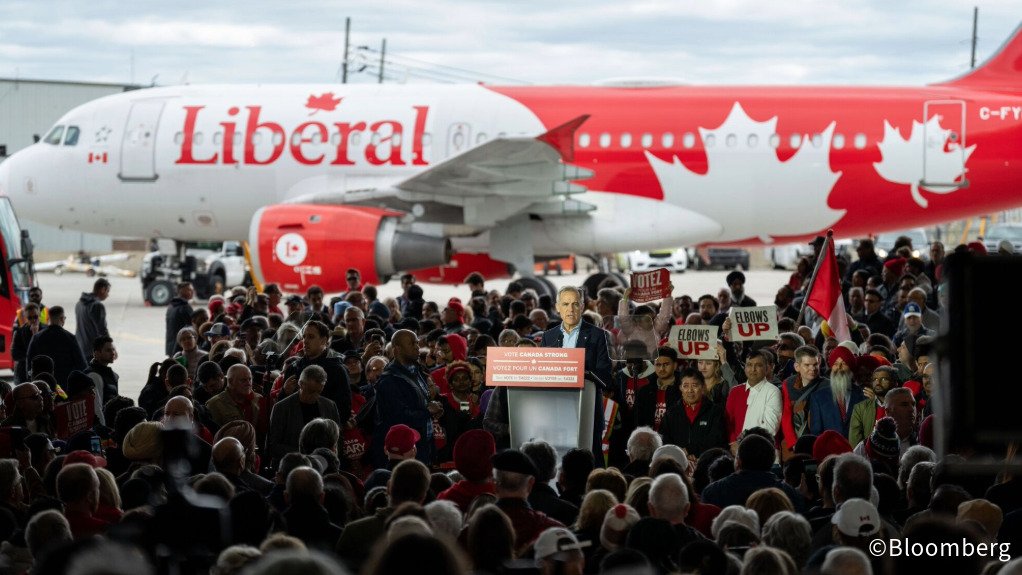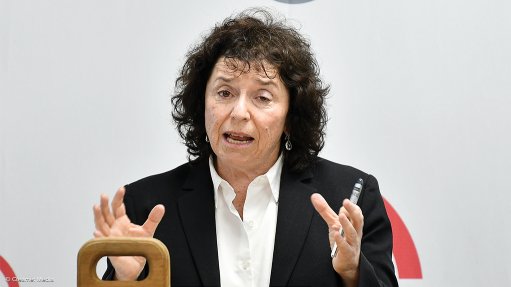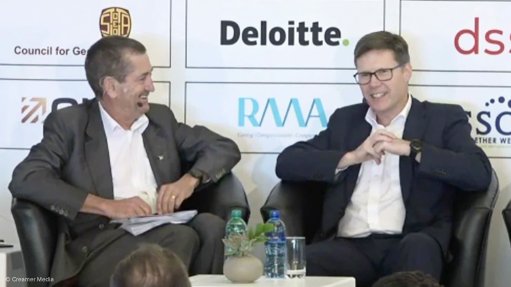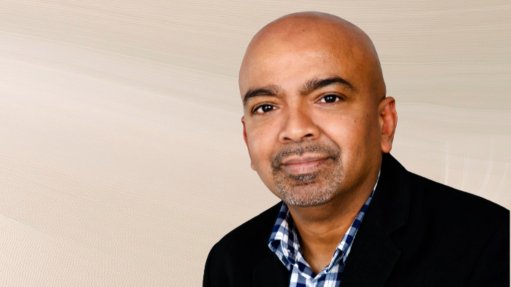Carney’s Liberals win Canada election, setting up talks with US
Canada’s Liberal Party won a fourth consecutive election, giving a mandate to former central banker Mark Carney after a campaign in which he pledged to boost economic growth and stand up to US President Donald Trump in a trade war.
Liberal candidates were leading or elected in 135 of the 343 seats, ahead of the Conservative Party with 88 as of 10:14 p.m. Ottawa time. The Liberals will secure enough seats to try to form a government, but it’s still unclear whether they’ll win a majority or be forced to work with other parties to pass legislation, according to projections from major TV networks.
The Liberals appeared to be winning big in the most populous provinces of Ontario and Quebec, manufacturing centers where key industries such as auto manufacturing, steel and aluminum are in the crosshairs of Trump’s tariffs. The party also continued its dominance of the four provinces in the Atlantic region.
Carney’s triumph represents a stunning turnaround for the Liberals, a party that has governed Canada for most of the past century but seemed on track for a historic electoral drubbing just four months ago. The ex-governor of the Bank of Canada and Bank of England became the party’s leader on March 9 and called an election only two weeks later. He leaned into his position as a prime minister who’d fight for Canada against an aggressive White House.
Carney, 60, tried to establish quickly that he was different from his predecessor, Justin Trudeau — more focused on the economy and on building new trade and security alliances, given the new foreign policy coming from Washington. His first steps were to cancel some of Trudeau’s less popular policies, such as a carbon tax on consumers, and to visit two European allies, French President Emmanuel Macron and UK Prime Minister Keir Starmer.
Once the election campaign began, he said repeatedly that Canadians needed to understand the country’s close relationship with the US has been ruptured by Trump’s actions, including the president’s claims that Canada should be the 51st state. In the final week of March, when Trump signed an order to implement auto tariffs, Carney said: “It’s clear that the United States is no longer a reliable partner.”
His calm, low-key manner in public and his experience as a policymaker and economist helped reassure voters that he was the best person to take on the challenge of guiding Canada in a new world order, and he swiftly won back people who had become disillusioned with Trudeau. One poll near the end of the campaign showed Carney with about a 10-point advantage over Poilievre on the question of who would make the best prime minister.
But now Carney has to live up to his claims of being a consummate crisis manager, after steering two Group of Seven central banks through the 2008 financial crash and Brexit.
The ultimate test will be dealing with the unpredictable US president, who has said he would use “economic force” against Canada and has made specific threats against its automotive sector and other industries. Carney has said he wants to kick off “comprehensive negotiations about a new economic and security relationship” with the Trump administration.
That is certain to include a review of the US-Mexico-Canada Agreement, the regional trade accord that Trump signed in his first term and called “the best agreement we’ve ever made” but now finds deficient. For Canada, the economic stakes couldn’t be higher: About three-quarters of its exports go to the US, including the vast majority of its oil and gas exports.
That makes Canada one of the most exposed countries to a prolonged trade war, and for many of its most important products, it can’t easily or quickly find alternative markets.
Carney inherits an economy that may be close to recession and has been unable to resolve a long-running productivity crisis. Canada is already subject to punishing tariffs from the US, with more likely on the way.
“The focus is going to be more on the health of the economy, diversifying trade partnerships, strengthening Canada’s economy,” said Lori Turnbull, a professor in the faculty of management at Dalhousie University in Halifax, Nova Scotia. “So this will be significant in terms of a departure from the Trudeau government priorities.”
The prime minister proposed “nation-building” mega-projects such as new energy infrastructure — but as an environmentalist, he also wants to keep green protections in place, such as an industrial carbon tax. Carney has suggested he wants to double housing construction, partly through a government-backed program to finance prefabricated homes. But the government has just slashed immigration targets, shrinking the opportunities for skilled trades workers from abroad.
What’s more, the leader of conservative, oil-rich province Alberta has already issued a list of demands and threatened “an unprecedented national unity crisis” if they aren’t met.
The Liberal leader set out a plan during the campaign to run deeper deficits, partly to increase spending on infrastructure and trim income taxes.
Carney was the chair of Bloomberg until January, when resigned that post to enter politics.
It’s a painful defeat for the Conservative Party, led by Pierre Poilievre, whose political momentum peaked too early. The 45-year-old politician dominated opinion polls by double- digit margins last year with promises to cut taxes and government spending, while building more homes and improving public safety.
Poilievre’s long-time rallying cries of ending the carbon tax and removing Trudeau were partly successful. Trudeau resigned and Carney ended the controversial consumer part of the tax within hours of taking office. But that forced Conservatives to establish a new message quickly, and they were slow to adjust to the new environment where Trump’s actions were a top concern among voters.
The Conservatives ran on a platform that emphasized tax cuts, cutting regulation and boosting investment in oil and gas and other sectors — measures that would generate faster economic growth and improve Canada’s position in dealing with Trump’s threats, Poilievre said.
But the Conservative campaign carried echoes of Trump’s methods, such as its promises to cut foreign aid, Poilievre’s combative relationship with traditional media, its targeting of diversity initiatives and even the party’s slogan “Canada First — For A Change.” Liberals used clips of Poilievre sounding like Trump, railing against “woke” culture and saying, “Everything is broken.” At a time when Trump is reviled by many Canadians for his threats against the country’s sovereignty, that was damaging to Poilievre’s chances.
Voters “look for somebody that they trust to make their dreams a reality, and I believe Mr. Poilievre incarnated that, but they also look for somebody that they like,” said Dimitri Soudas, who was communications director to former Prime Minister Stephen Harper. “I believe he is trusted. I believe he is respected for his vision for the country. He chose to not be likable. And in my view, that was a mistake.”
Poilievre also struggled to recruit high-profile candidates and to create the kind of alliances needed for a winning coalition. For example, his campaign was repeatedly criticized by allies of Doug Ford, who has won three straight majority governments in Ontario for his provincial party, the Progressive Conservatives. But Ford held a friendly photo-op with Carney in March.
Comments
Press Office
Announcements
What's On
Subscribe to improve your user experience...
Option 1 (equivalent of R125 a month):
Receive a weekly copy of Creamer Media's Engineering News & Mining Weekly magazine
(print copy for those in South Africa and e-magazine for those outside of South Africa)
Receive daily email newsletters
Access to full search results
Access archive of magazine back copies
Access to Projects in Progress
Access to ONE Research Report of your choice in PDF format
Option 2 (equivalent of R375 a month):
All benefits from Option 1
PLUS
Access to Creamer Media's Research Channel Africa for ALL Research Reports, in PDF format, on various industrial and mining sectors
including Electricity; Water; Energy Transition; Hydrogen; Roads, Rail and Ports; Coal; Gold; Platinum; Battery Metals; etc.
Already a subscriber?
Forgotten your password?
Receive weekly copy of Creamer Media's Engineering News & Mining Weekly magazine (print copy for those in South Africa and e-magazine for those outside of South Africa)
➕
Recieve daily email newsletters
➕
Access to full search results
➕
Access archive of magazine back copies
➕
Access to Projects in Progress
➕
Access to ONE Research Report of your choice in PDF format
RESEARCH CHANNEL AFRICA
R4500 (equivalent of R375 a month)
SUBSCRIBEAll benefits from Option 1
➕
Access to Creamer Media's Research Channel Africa for ALL Research Reports on various industrial and mining sectors, in PDF format, including on:
Electricity
➕
Water
➕
Energy Transition
➕
Hydrogen
➕
Roads, Rail and Ports
➕
Coal
➕
Gold
➕
Platinum
➕
Battery Metals
➕
etc.
Receive all benefits from Option 1 or Option 2 delivered to numerous people at your company
➕
Multiple User names and Passwords for simultaneous log-ins
➕
Intranet integration access to all in your organisation




















